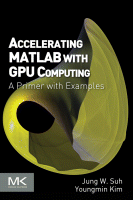Browse content
Table of contents
Actions for selected chapters
- Full text access
- Book chapterAbstract only
1 - Accelerating MATLAB without GPU
Pages 1-17 - Book chapterAbstract only
2 - Configurations for MATLAB and CUDA
Pages 19-44 - Book chapterAbstract only
3 - Optimization Planning through Profiling
Pages 45-72 - Book chapterAbstract only
4 - CUDA Coding with c-mex
Pages 73-97 - Book chapterAbstract only
5 - MATLAB and Parallel Computing Toolbox
Pages 99-125 - Book chapterAbstract only
6 - Using CUDA-Accelerated Libraries
Pages 127-155 - Book chapterAbstract only
7 - Example in Computer Graphics
Pages 157-191 - Book chapterAbstract only
8 - CUDA Conversion Example: 3D Image Processing
Pages 193-231 - Book chapterNo access
Appendix 1 - Download and Install the CUDA Library
Pages 233-238 - Book chapterNo access
Appendix 2 - Installing NVIDIA Nsight into Visual Studio
Pages 239-241 - Book chapterNo access
Bibliography
Pages 243-244 - Book chapterNo access
Index
Pages 245-248
About the book
Description
Beyond simulation and algorithm development, many developers increasingly use MATLAB even for product deployment in computationally heavy fields. This often demands that MATLAB codes run faster by leveraging the distributed parallelism of Graphics Processing Units (GPUs). While MATLAB successfully provides high-level functions as a simulation tool for rapid prototyping, the underlying details and knowledge needed for utilizing GPUs make MATLAB users hesitate to step into it. Accelerating MATLAB with GPUs offers a primer on bridging this gap.
Starting with the basics, setting up MATLAB for CUDA (in Windows, Linux and Mac OS X) and profiling, it then guides users through advanced topics such as CUDA libraries. The authors share their experience developing algorithms using MATLAB, C++ and GPUs for huge datasets, modifying MATLAB codes to better utilize the computational power of GPUs, and integrating them into commercial software products. Throughout the book, they demonstrate many example codes that can be used as templates of C-MEX and CUDA codes for readers’ projects. Download example codes from the publisher's website: http://booksite.elsevier.com/9780124080805/
Beyond simulation and algorithm development, many developers increasingly use MATLAB even for product deployment in computationally heavy fields. This often demands that MATLAB codes run faster by leveraging the distributed parallelism of Graphics Processing Units (GPUs). While MATLAB successfully provides high-level functions as a simulation tool for rapid prototyping, the underlying details and knowledge needed for utilizing GPUs make MATLAB users hesitate to step into it. Accelerating MATLAB with GPUs offers a primer on bridging this gap.
Starting with the basics, setting up MATLAB for CUDA (in Windows, Linux and Mac OS X) and profiling, it then guides users through advanced topics such as CUDA libraries. The authors share their experience developing algorithms using MATLAB, C++ and GPUs for huge datasets, modifying MATLAB codes to better utilize the computational power of GPUs, and integrating them into commercial software products. Throughout the book, they demonstrate many example codes that can be used as templates of C-MEX and CUDA codes for readers’ projects. Download example codes from the publisher's website: http://booksite.elsevier.com/9780124080805/
Key Features
- Shows how to accelerate MATLAB codes through the GPU for parallel processing, with minimal hardware knowledge
- Explains the related background on hardware, architecture and programming for ease of use
- Provides simple worked examples of MATLAB and CUDA C codes as well as templates that can be reused in real-world projects
- Shows how to accelerate MATLAB codes through the GPU for parallel processing, with minimal hardware knowledge
- Explains the related background on hardware, architecture and programming for ease of use
- Provides simple worked examples of MATLAB and CUDA C codes as well as templates that can be reused in real-world projects
Details
ISBN
978-0-12-408080-5
Language
English
Published
2014
Copyright
Copyright © 2014 Elsevier Inc. All rights reserved.
Imprint
Morgan Kaufmann
